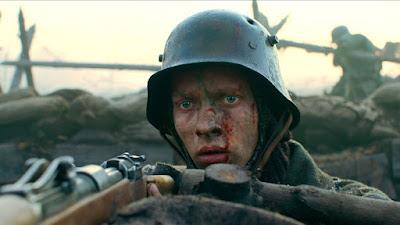Format: Streaming video from NetFlix on Fire!

There seems to be no end to movies about war. There are, of course, films that depict war as something glorious, as a thing to be, if not encouraged at least welcomed. Certainly, there are those that depict war as something to be sought after as well. And then there are those films that show war as something terrible and a hell unto itself. Films like Come and See, Paths of Glory, and Das Boot depict war as senseless, endless brutality and a desperate hope to avoid death. The original All Quiet on the Western Front remains one of the greatest anti-war statements in history. To that we can add the 2022 German reimagining of the same name, also know by its German title of Im Westen nichts Neues (which means “Nothing new in the west” if my German hasn’t failed me).
This is, in fact, the third version of this story that I have seen. The first I saw was the 1979 made-for-TV re-imagining starring Richard Thomas, which is very much the weakest of the three. The 1930 film won Best Picture, of course, and as mentioned is still an extremely powerful film. And then there is this latest version, which holds nothing back on the true horror of trench warfare.
There are a two things that make this latest telling of All Quiet on the Western Front substantially different from the other two versions. The first is that this is a German film. The story has always come from a German perspective, of course, but in this case, the film itself is a German production with German actors. Much like Das Boot felt somehow more poignant and relevant because of how it was produced, the same is true here.
The second is that in this production, for the first time we spend a good amount of time behind the scenes with the political leaders of the time working to craft the armistice to end the war. Much of this falls on the head of Matthias Erzberger (Daniel Brühl), who finds himself desperate to end the slaughter at the front while dealing simultaneously with the French who are demanding a complete capitulation and the German High Command that refuses to budge due to honor. And while Erzberger has food and warmth and isn’t being shot at, his hell is in many ways no less than that of the soldiers. His anguish serves as a counterpoint to that of the French military leaders who fret over their pastries not being fresh.
The soldier we are going to follow through the conflict is Paul Bäumer (Felix Kammerer), who enters the war at 18, is immediately baptized by fire, and survives for the next two years in any way that he can. After Paul’s first night at the front with his friends from school, we pick up his story a few days before the signing of the Armistice that ended the war on November 11, 1918. In those two years, Paul has lost many of his friends and has aged far beyond the 24 months of his time at the front.
The story is anti-war, of course, but this version of it hews closer to a film like Come and See in the brutality it depicts combined with the mindless frustration and cruelty of Paths of Glory. And we watch, knowing that these men are doomed even as the war comes to a close. The unending grinding terror and horror of the war will crush all of them, spitting them out dead or mangled.
This version of the story hits most of the main beats of the 1930 version. Paul is never sent home wounded to confront the teacher who whipped him and his doomed comrades into a military frenzy, but the other important story points are all here in one way or another.
I find it one of the oddities of Oscar that while war movies continue to be nominated in multiple categories (both this and Top Gun: Maverick are Best Picture nominations this year), there seems to be a great deal of resistance to nominating actors in war films. At the very least, Felix Kammerer deserved some consideration here, and I think both Daniel Brühl and Albrecht Schuch, who plays Paul’s battlefield mentor Kat should have been looked at in supporting roles.
I’m not going to lie--All Quiet on the Western Front is not an easy film to watch and not one I would happily sit through again any time soon. This has nothing to do with the quality of the film and everything to do with the brutality and hopelessness of the story it is telling. This is a story of senseless waste and destruction, a tale of terrible nihilism where nothing good happens to anyone. The conclusion we reach is as terrible as it is inevitable and nothing will stop us from how it will end. There is no patriotic sacrifice here, no ultimate reason for the suffering. There’s just the suffering and the endless, pointless destruction.
Don’t misunderstand; it’s a hell of a film. It’s simply one that demands to be watched even while it dares you to shut it off. And when it’s done, all you will be left with is the ominous soundtrack and the endless blood of the dead and dying.
Why to watch All Quiet on the Western Front: Because war is truly hell.
Why not to watch: Despair.
